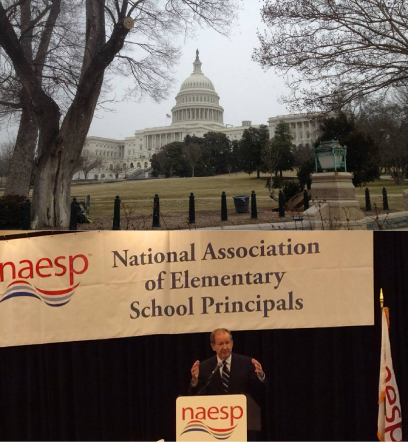CT Delegates Lobby Federal Legislators on ESEA

NAESP National Leaders Conference opens with Pat Buchanan.
On February 23rd, Vickie Reed, Roxanne Augelli and Michael Like took the opportunity to attend NAESP’s National Leaders Conference and met with our state congressmen and senators to advocate on behalf of principals regarding the reauthorization of the Elementary and Secondary Education Act (ESEA). The following were identified as our top five priorities:
1. Oppose any efforts to include Title I public or private school “portability”—even if it limits portability to public schools.
2. Differentiate and support the role of principals consistent with the Principal Recruitment and Training Act of 2015.
a. Clearly define the term “school leader” to mean a principal or assistant principal working inside the school building, not non-building staff such as teacher leaders, superintendents and other district personnel;
b. Include high-quality recruitment, preparation and on-going, job-embedded professional development such as programs in the Principal Recruitment and Training Act of 2015; and,
c. Require districts that receive Title II funds to allocate no less than 10 percent of funds for principal professional development.
3. Base accountability systems on student growth and include multiple measures, and ensure that any new policies put an end to the overuse of standardized assessments.
4. Include early childhood education and support for Pre-K-3 alignment.
5. Set authorization levels that are consistent with the needs of schools and students.
The following positive actions have recently occurred as a result of CAS and NAESP’s collective advocacy efforts:
- Establishment of the Washington DC-based Coalition for Principal and School Leadership, to advance policy and legislation that will better support the role of the nation’s principals.
- Passage of language in the FY 2015 appropriations bill to help redirect federal funds at the state and local levels to support the role of principals through access to additional professional learning opportunities. This policy language also directed the U.S. Department of Education to issue policy guidance to states and districts to take action to support principals.
- Introduction of a comprehensive bill to support recruitment, preparation and on-going support for the role of principals in federal law in both the House and Senate, which is advancing in the reauthorization of the Elementary and Secondary Education Act.
- Three qualified policy efforts that will better support the role of principals in key bills and legislation that previously only focused on teachers. These efforts include new support by the teachers’ unions and other educator-focused organizations that put in place a set-aside of funds at the federal level that states and districts must use for principal professional development only.
- Adoption of an amendment by the House of Representatives in the reauthorization of the Elementary and Secondary Education Act that set the national definition of a “school leader” as the principal of a school building.
- Launch of a national communications campaign that focuses on greater recognition of the role of principals in student success, and a call on state and local policymakers to provide better support for school leaders in local educational systems.
CAS would like to recognize the efforts of all involved, with a special thanks to Kelly Pollitt, NAESP Associate Executive Director for Policy, Public Affairs and Special Projects, for her expertise and outstanding communication and preparation in assisting our advocacy efforts on behalf of elementary and middle level principals.
By Michael Litke, Principal, Naubuc School, Glastonbury
CAS’ NAESP Federal Relations Coordinator
